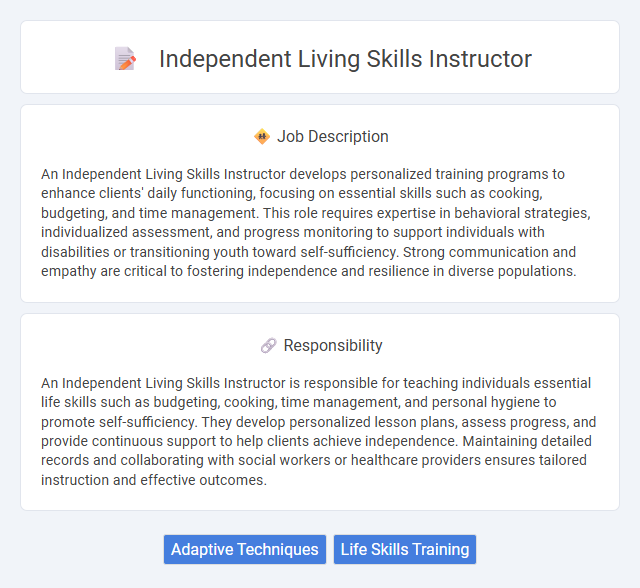
An Independent Living Skills Instructor develops personalized training programs to enhance clients' daily functioning, focusing on essential skills such as cooking, budgeting, and time management. This role requires expertise in behavioral strategies, individualized assessment, and progress monitoring to support individuals with disabilities or transitioning youth toward self-sufficiency. Strong communication and empathy are critical to fostering independence and resilience in diverse populations.
Individuals who possess strong empathy, patience, and communication skills are likely suitable for a role as an independent living skills instructor, as the job involves supporting people with varying levels of independence. Those comfortable working with individuals facing physical, developmental, or cognitive challenges may find this position particularly fulfilling and appropriate to their abilities. Candidates who thrive in dynamic, people-centered environments with a focus on promoting autonomy and daily living skills tend to be well-suited for this role.
Qualification
An Independent Living Skills Instructor typically requires a minimum of a bachelor's degree in social work, psychology, special education, or a related field, supplemented by experience working with individuals with disabilities or special needs. Certifications such as CPR, First Aid, or training in behavior management and life skills coaching enhance the qualifications. Strong communication, patience, and adaptability are essential for effectively teaching daily living, social, and vocational skills to promote client independence.
Responsibility
An Independent Living Skills Instructor is responsible for teaching individuals essential life skills such as budgeting, cooking, time management, and personal hygiene to promote self-sufficiency. They develop personalized lesson plans, assess progress, and provide continuous support to help clients achieve independence. Maintaining detailed records and collaborating with social workers or healthcare providers ensures tailored instruction and effective outcomes.
Benefit
Working as an Independent Living Skills Instructor likely enhances one's ability to support individuals in gaining essential life skills, promoting personal growth and self-sufficiency. This role probably offers the opportunity to make a meaningful impact on the lives of others while developing strong communication and teaching abilities. The job may also provide a sense of fulfillment from facilitating increased independence among diverse populations.
Challenge
An Independent Living Skills Instructor job likely involves the challenge of tailoring teaching methods to diverse learning abilities and backgrounds. The role probably requires adapting quickly to changing needs of individuals to foster their self-sufficiency effectively. Managing emotional and behavioral challenges in learners might also be a frequent and demanding aspect of the position.
Career Advancement
Independent living skills instructors build essential competencies in clients, paving the way for career growth in social services and education sectors. Mastery in individualized training and program development enhances opportunities for supervisory roles and specialized certifications. Continuous professional development and networking within community organizations significantly boost prospects for leadership positions.
Key Terms
Adaptive Techniques
An Independent Living Skills Instructor specializes in teaching adaptive techniques to individuals with disabilities, enabling them to perform daily tasks independently. This role involves instructing clients in skills such as personal care, household management, and effective communication, tailored to their unique needs and abilities. Mastery of adaptive techniques empowers clients to increase their autonomy and improve their quality of life.
Life Skills Training
An Independent Living Skills Instructor specializes in Life Skills Training to empower individuals with disabilities or those transitioning to independent living. This role involves teaching essential daily tasks such as financial management, meal preparation, personal hygiene, and effective communication. Mastery of these skills promotes autonomy, enhances confidence, and supports successful community integration.
 kuljobs.com
kuljobs.com